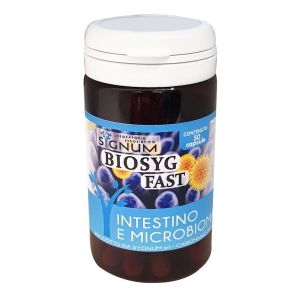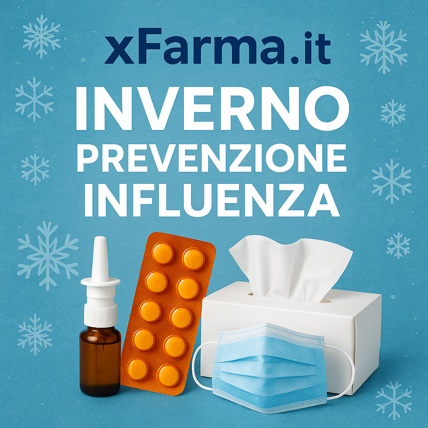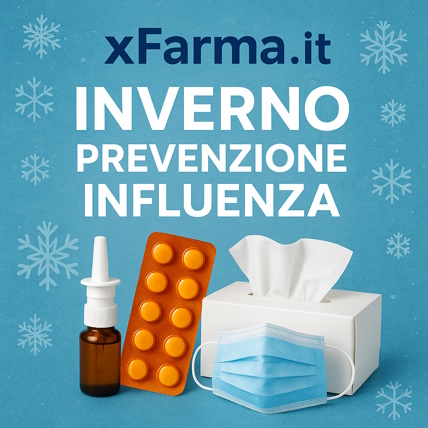Ship in Europe, Find out rates!
BioSyg Fast 50 Tablets

- box Delivery in Italy in 24/48 and free returns
- star3.000+ positive reviews
- dropboxOver 60,000 products in the catalog
The Biosyg FAST contains butyric acid which improves the barrier function of the intestine and Citrus sinensis to improve intestinal permeability and to influence the potential of the intestinal microbiome.
Ingredients and daily content
butyric acid sodium salt 1350mg, Orange (Citrus sinensis L.) pericarp dry extract (tit. hesperidin 85%) 135mg, Acacia (Acacia catechu L. Willd.) 15mg. Capsule composition: 100% gelatin.
Content
in PET pill container, 50 capsules of 330mg (15g).
How to use
3 capsules per day.
Physiological effect
Citrus: digestive function.
Acacia: prebiotic, balance of intestinal flora.
Characteristics
Biosyg fast, as the name suggests, has the same properties as Biosyg but acts faster, as it already contains butyric acid and has a smaller quantity of Citrus sinensis.
This product is therefore recommended for the first 15-30 days and can then be replaced by Biosyg, which no longer contains butyric acid, but a high quantity of Citrus s.; the Citrus s. in fact it stimulates the production of butyric acid, with a lower dosage and cost.
CITRUS SINENSIS: flavonoids extracted directly from citrus fruits influence the potential of the intestinal microbiome and increase the barrier function of the intestine, acting on INTESTINAL PERMEABILITY SYNDROME (LEAKY GUT SYNDROME). This Citrus sinensis extract is particularly concentrated in hesperidin, one of the most studied flavonoids to fight intestinal permeability and inflammation.
Starting from this extract, highly concentrated in hesperidin, of Citrus in Holland, a clinical study was carried out at the Maastricht University Medical Center (MUMC) aimed at demonstrating the benefits on the composition of the intestinal microbiome.
The results demonstrated:
• a strong tendency to decrease faecal calprotectin, reflecting decreases in pathogenic bacterial load and inflammation;
• a significant change on the composition of short chain fatty acids (SCFA), in fact the extract increased the proportion of butyrate, on the total SCFA. This is a direct consequence of the positive change in the gut microbiome.
Many of the physiological effects of the intestinal microbiota are linked to its production of SCFAs: these metabolites are in fact known for their anti-oxidant, anti-inflammatory and immunomodulatory effects. Furthermore, in vitro studies have shown that hesperidin in particular can significantly modulate the intestinal microbiota, especially the Clostridium cluster XIVa, which have many beneficial effects in particular through the production of BUTYRATE.
Butyrate (or butyric acid):
• has a role in inflammation, through the inhibition of NF-kB of colon epithelial cells. The dysregulation of NF-kB activity is linked to the pathogenesis of colon cancer and inflammatory bowel diseases, such as ulcerative colitis and Crohn's disease;
• improves the barrier function of the intestine, through the inhibition of the release of TNF-α and IL-13 and through the inhibition of histone deacetylase (HDAC). With these two mechanisms of action, butyrate contributes to the restoration of the tight-junctions (tight junctions) between the cells of the intestinal mucosa.
ACACIA (Acacia catechu Willd.): recent medical studies have demonstrated its efficacy as a prebiotic. Its fiber is highly digestible and patients have not presented any flatulence disturbance following its intake. What characterizes acacia fiber compared to other fibers used as prebiotics is its specifically bifidogenic activity, i.e. capable of selectively stimulating the growth of intestinal bacterial flora of the genus Bifidobacterium. Among the positive effects accepted by the scientific community, the following are summarized:
• modulation of digestion;
• the increase in faecal mass (multiplication of "useful" bacteria and liquid absorption);
• the increase in the number of “useful” intestinal bacteria (bifidobacteria);
• help in regulating cholesterol levels;
• synergy in antioxidant processes.
More specifically, the intestinal fermentation of this fiber leads to the production of butyrate, a compound considered physiologically important for the previously mentioned reasons.
| Destination | Cost | Detail |
|---|---|---|
| Italy | €5,90* | 24/72H |
| Austria, France, Germany, Slovenia | € 13* | 3 days |
| Belgium, Luxembourg, Portugal, Netherlands, Spain | € 14* | 4 days |
| Bulgary, Cechia, Hungary, Poland, Romania, Slovakia | € 19* | 5 days |
| Denmark, Estonia, Finland, Ireland, Lithuania, Latvia ,Sweden | € 22* | 5 days |
| United Kingdom, Switzerland, Greece, Malta/td> | € 30* | 7 days |
| Canada | € 40 | 7 Days |
European shipments with express courier: FedEx, MBE, DHL
*For the shipment outside band B ther's an extra cost of 22€ *For the shipment outside band C ther's an extra cost of 30€ Delivery Times exclude Saturday and Holidays
For Islands and Areas of difficult Accessibility the shipments are made in 72 hours and the cost will be increased by 15€

